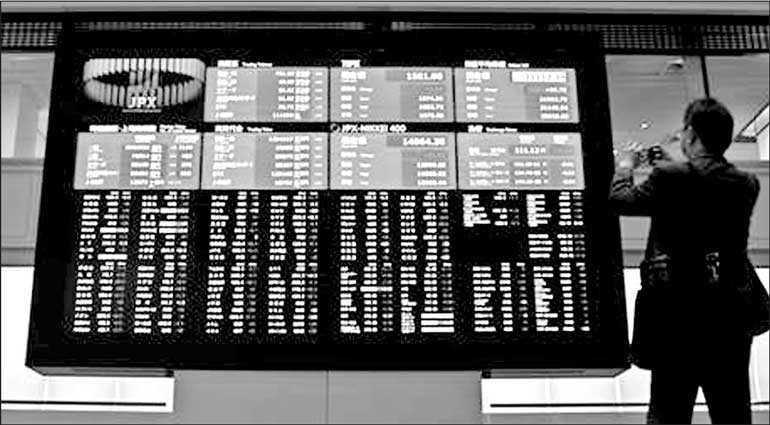Sunday Feb 22, 2026
Sunday Feb 22, 2026
Saturday, 15 February 2020 00:10 - - {{hitsCtrl.values.hits}}

A visitor takes a photo of screens displaying stock indices at the Tokyo Stock Exchange
(TSE), operated by Japan Exchange Group Inc
TOKYO (Reuters): Asian shares edged up on Friday, on course to post the second straight week of gains, helped by hopes governments will make provisions to soften the impact on their economies from the coronavirus epidemic.
MSCI’s broadest index of Asia-Pacific shares outside Japan ticked up 0.3%, led by gains in Hong Kong and South Korea. On the week, the pan-regional index was up 1.94%.
“China is already easing its monetary policy and providing more liquidity while more stimulus is likely. Factories are starting to reopen albeit with some delays,” said Yukino Yamada, senior strategist at Daiwa Securities.
Japan’s Nikkei dropped 0.55%, not helped by the news of first coronavirus death and signs of a potential rise in domestic human-to-human infections in the country.
On Wall Street on Thursday, the S&P 500 lost 0.16% but its futures gained 0.23% in subsequent Asian trade to hit record levels.
The daily death toll in Hubei, the Chinese province at the centre of the coronavirus outbreak, halved and the number of new cases dropped from a record posted the day before.
Ryutaro Kimura, fixed income strategist at Axa Investment Management, expected “considerable impact” on the global economy as China now accounts for around 17% compared to 4% during the SARS outbreak in 2002-2003, and it is integral to more supply chains.
“That means countries are likely to keep interest rates low for a longer period, keeping global bond yields low. Such an expectation in turn is supporting the world’s share prices.”
Market sentiment improved also after World Health Organization official said the big jump in China’s reported cases reflects a decision by authorities there to reclassify a backlog of suspected cases by using patients’ chest images, and is not necessarily the “tip of an iceberg” of a wider epidemic, Still, sceptics saw it as undermining confidence in data accuracy, a constant issue in Chinese data.
While many investors hope the epidemic will gradually slowdown in coming months, allowing companies and businesses to come back to normal operations, how long that process will take remains anybody’s guess.
“Until Wednesday, people had been saying that you can buy shares because the number of new cases had peaked out. The reality seems to be quite different. An early end to this seems improbable,” said Norihiro Fujito, chief investment strategist at Mitsubishi UFJ Morgan Stanley Securities.
“Investors will surely avoid Asia for the time being and will shift funds to the US, geographically the most separated from the region,” he said.
That meant more demand for the US dollar in the currency exchange market.
The dollar’s index against a basket of currencies hit a four-month high, having risen 1.8% so far this month.
The euro fell to as low as $ 1.0827, its lowest level in almost three years, and last stood at $ 1.0836. It also hit a nine-week low against the British pound and 4-1/2 year low against the Swiss franc.
The euro has been bruised also by rising political uncertainties in Germany as well as worries about sluggish growth in the region.
Annegret Kramp-Karrenbauer, who had been long expected to succeed Chancellor Angela Merkel next year, earlier this week gave up her bid to run for the top job, raising more concerns about political stability in the euro zone’s biggest economy.
Euro zone GDP data due later on Friday is expected show a sluggish growth of 0.1% from the previous quarter.
Sterling jumped and so did UK bond yields as investors bet on a higher-spending budget next month after British Prime Minister Boris Johnson forced the resignation of Sajid Javid as finance minister. Javid, known to have been at odds with Johnson’s powerful policy adviser Dominic Cummings over spending plans, was replaced by Rishi Sunak, a Johnson loyalist.
The pound traded at $ 1.3045, after 0.65% gains on Thursday.
The 10-year gilts yield jumped to a three-week high of 0.660%, bucking falling yields in most other major bond markets. The yen stayed in a familiar range in the past couple of weeks and last traded at 109.86 yen.
Oil prices extended their week-old recovery on hopes that the world’s biggest producers would cut output more as demand looks set to drop sharply due to the outbreak of coronavirus.
The International Energy Agency (IEA) expects oil demand in the first quarter to fall for the first time in 10 years.
US West Texas Intermediate (WTI) crude futures were up 0.12% at $ 51.48 per barrel in early Friday trade but up 2.3% on the week, on course to post their first weekly gains in six weeks.